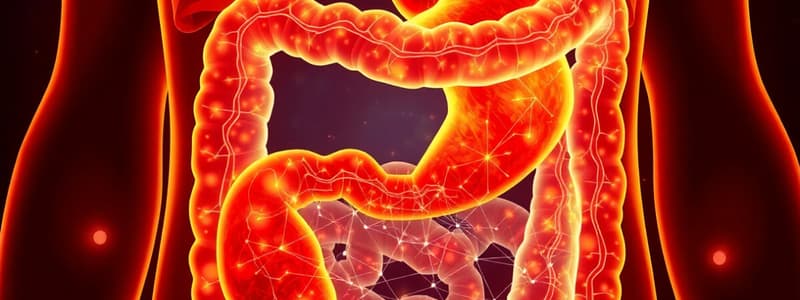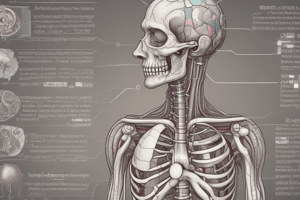Podcast
Questions and Answers
What is the primary function of the stomach in the digestive system?
What is the primary function of the stomach in the digestive system?
- Absorbing nutrients
- Transporting food to the small intestine
- Mixing food with digestive juices (correct)
- Eliminating waste material
Which organ is responsible for the majority of nutrient absorption?
Which organ is responsible for the majority of nutrient absorption?
- Stomach
- Large intestine
- Liver
- Small intestine (correct)
What role does bile play in digestion?
What role does bile play in digestion?
- Breakdown of proteins into amino acids
- Digestive enzyme for carbohydrates
- Transport of food through the esophagus
- Emulsification of fats (correct)
Which enzyme is responsible for the initial breakdown of carbohydrates in the mouth?
Which enzyme is responsible for the initial breakdown of carbohydrates in the mouth?
What is the main function of the large intestine in the digestive process?
What is the main function of the large intestine in the digestive process?
Flashcards
What is the function of the digestive system?
What is the function of the digestive system?
The digestive system breaks down food into smaller molecules, absorbs nutrients, and eliminates waste. It involves both mechanical and chemical processes.
What are the two main parts of the digestive system?
What are the two main parts of the digestive system?
The alimentary canal is a continuous tube that runs from the mouth to the anus, while accessory organs support digestion.
What happens in the mouth during digestion?
What happens in the mouth during digestion?
The mouth is where mechanical digestion (chewing) and initial chemical digestion of carbohydrates (by salivary amylase) occur.
What is the role of the small intestine in digestion?
What is the role of the small intestine in digestion?
Signup and view all the flashcards
What are the accessory organs and their functions?
What are the accessory organs and their functions?
Signup and view all the flashcards
Study Notes
Overview of the Digestive System
- The digestive system is a complex series of organs working together to break down food and absorb nutrients, eliminating waste.
- It performs both mechanical and chemical digestion.
- It consists of the alimentary canal (a continuous tube) and accessory organs.
Alimentary Canal
- The alimentary canal is a muscular tube extending from the mouth to the anus.
- It includes the mouth, pharynx, esophagus, stomach, small intestine, large intestine, and anus.
- Each section of the canal has specific functions in food processing.
Mouth
- Mechanical digestion begins with chewing (mastication) in the mouth.
- Saliva contains amylase, initiating carbohydrate digestion.
- Food is formed into a bolus and swallowed.
Pharynx and Esophagus
- The pharynx serves as a passageway for both air and food.
- The esophagus transports the bolus to the stomach via peristalsis.
Stomach
- The stomach stores ingested food and mixes it with digestive juices.
- Gastric glands secrete hydrochloric acid and pepsin, an enzyme.
- Partially digested food, now called chyme, is released to the small intestine.
Small Intestine
- The small intestine, the longest part of the alimentary canal, is the primary site of chemical digestion and nutrient absorption.
- It is divided into the duodenum, jejunum, and ileum.
- The duodenum receives secretions from the liver and pancreas.
- The small intestine's large surface area, due to villi and microvilli, maximizes nutrient absorption.
Large Intestine
- The large intestine absorbs water and electrolytes, forming and storing waste (feces) before elimination.
- Microbial actions ferment undigested material and produce vitamins.
Accessory Organs
- The liver, pancreas, and gallbladder are accessory organs aiding digestion.
- The liver produces bile, essential for fat digestion.
- The pancreas produces enzymes (amylase, lipase, protease) to digest carbohydrates, fats, and proteins. It also secretes bicarbonate to neutralize stomach acid.
- The gallbladder stores bile and releases it into the small intestine for fat digestion.
Digestion of Macronutrients
- Carbohydrates: Broken down into simple sugars (glucose) in the mouth and small intestine.
- Proteins: Broken down into amino acids in the stomach and small intestine.
- Fats: Broken down into fatty acids and glycerol in the small intestine, with bile aiding the process.
Factors Affecting Digestion
- Insufficient enzyme production can hinder digestion and absorption.
- High-fat or high-fiber diets can slow digestion and contribute to discomfort.
- Certain conditions and medications can impact digestive processes.
Regulation of Digestion
- Hormones regulate digestion at different stages.
- Gastrin, secretin, and cholecystokinin are key examples.
Digestive Disorders
- Conditions like heartburn, ulcers, inflammatory bowel disease, and celiac disease affect the digestive system.
- These conditions vary in severity and treatment approach.
Importance of Healthy Digestion
- Proper digestion is critical for nutrient absorption and overall well-being.
- Understanding the digestive process enables informed dietary and lifestyle choices for better health.
Studying That Suits You
Use AI to generate personalized quizzes and flashcards to suit your learning preferences.
Description
Explore the intricate workings of the digestive system, including the roles of the alimentary canal and accessory organs. Delve into how food is mechanically and chemically digested from the mouth to the stomach. This quiz covers the essential functions of each section, emphasizing the importance of nutrient absorption and waste elimination.



